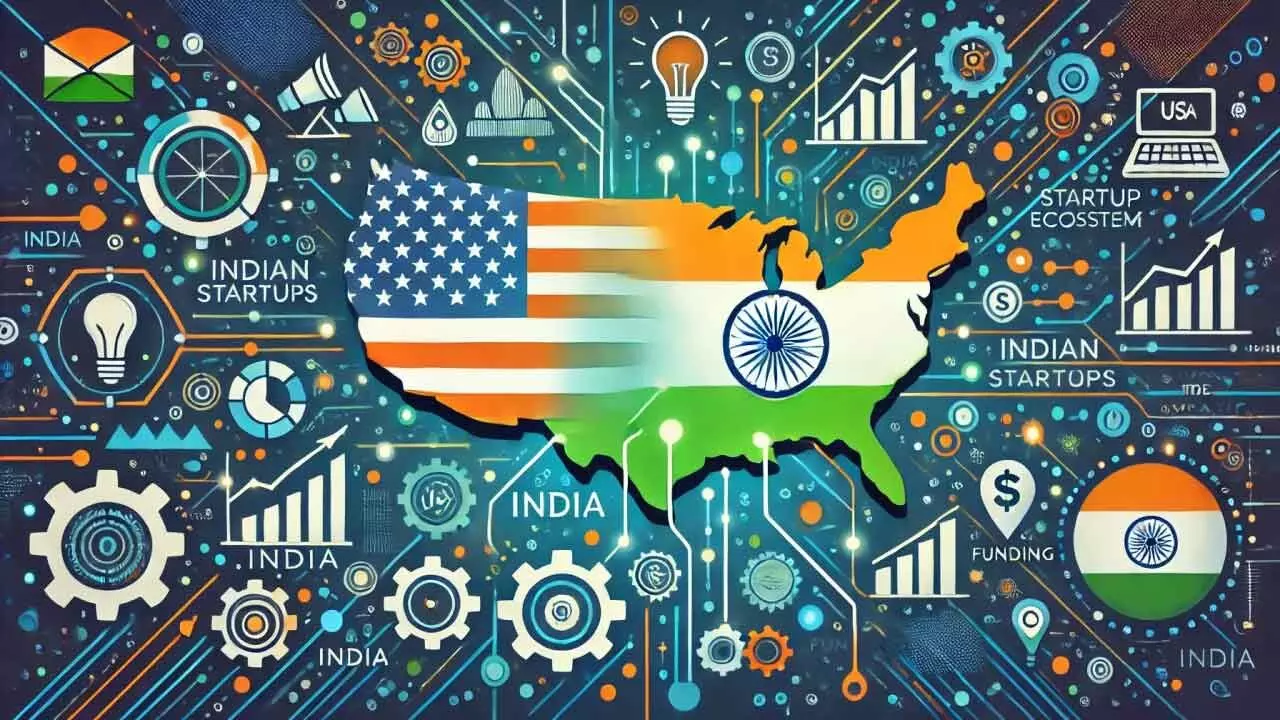Indian Startups, Adept At Navigating Changing Market Conditions, Remain Top Draw For Investors
Indian startups raised $30.4 billion in funding in 2024, a 6.5 per cent de-cline from 2023
Indian Startups, Adept At Navigating Changing Market Conditions, Remain Top Draw For Investors

Many startups still face challenges related to inadequate physical infrastruc-ture, particularly in Tier 2 and Tier 3 cities. This can hugely affect logistics, supply chain management and overall operational efficiency
The Indian startup ecosystem experienced a rollercoaster ride in 2024, character-ised by a slight-yet-concerning decline in funding activity and a shift in investor sen-timent, alongside a silver lining with several startups achieving unicorn status. De-spite facing global economic challenges, India's startups showcased remarkable re-silience, adeptly navigating changing market conditions, while continuing to attract investments.
According to data from Tracxn, Indian startups raised a total of $30.4 billion in funding throughout 2024, a 6.5 per cent decline from the $32.5 billion secured in 2023.
Despite this dip, the Indian startup ecosystem demonstrated resilience, with several companies achieving unicorn status this year.
Noteworthy entrants to the unicorn club include Rapido, Ather, Perfios, Porter and Money View, highlighting ongoing innovation and investment interest in the sector.
The overall funding trend reflects a cautious-yet-optimistic approach from inves-tors, as they navigate a more selective funding environment, while still recognising the potential of high-growth startups in India. A slight shift towards early-stage in-vestments was evident during the year, with seed and Series A rounds gaining trac-tion, as investors sought to back innovative ideas with long-term potential.
Businesses that could demonstrate robust underlying unit economics found greater favour this year, Dushyant Singh, managing partner at Playbook Partners, noted.
Gig economy, retail, and enterprise applications stood out as top-performing sec-tors, according to Traxcn.
Quick commerce emerged as a high-growth sector, with 40 active companies, in-cluding unicorns Zepto, Blinkit, and Swiggy Instamart, and promising newcomers Dunzo, Swish, and Farmako. The government had in July announced abolishment of the angel tax on investments in startups to provide a more conducive environment for growth.
"By eliminating this tax, the government has provided a much-needed boost to in-vestors and entrepreneurs, enabling greater liquidity and more flexible funding op-tions for startups. However, fewer funding rounds, high operational costs, and infra-structure challenges remain ongoing factors that need attention," said Jeenendra Bhandari, Chairman, JITO Incubation and Innovation Foundation (JIIF).
There was an encouraging rise in women entrepreneurs and founders from Tier 2 and 3 towns.
Ninad Karpe from 100X.VC said the entrepreneurial culture has transcended its traditional boundaries.
"The entrepreneurial culture has transcended its traditional boundaries, seeping in-to colleges, schools, and even Tier 2 and 3 towns. Founders from these regions are bringing fresh perspectives, solving hyper-local problems and creating opportuni-ties that were previously untapped. "There's a noticeable rise in women entrepre-neurs, signalling a positive shift in inclusivity and diversity within the startup eco-system," he said. According to official data, India has more than 73,000 startups with at least one woman director that have been recognised under the Startup India Initiative. Despite the positive trends, challenges persist.
Global economic uncertainties have a direct impact on investor sentiment and fund-ing availability. "While the number of deals has seen a quarterly increase of 10-20 per cent... deal values have declined significantly. This reflects a cautious investment climate, with most funding rounds being either follow-ons by existing investors or bridge rounds aimed at extending the runway rather than driving growth. The focus has shifted from valuation-driven funding to sustainability and profitability," FAAD Capital CEO Aditya Arora said.
The growth in venture capital was mainly driven by increase in mid and late-stage investment, Singh seconded.
Startups continue to grapple with rising operational costs, which can strain their financial sustainability. Several Indian startups have gained fame and achieved uni-corn status despite not being profitable. Many startups still face challenges related to inadequate physical infrastructure, particularly in Tier 2 and Tier 3 cities. This can hugely affect logistics, supply chain management and overall operational effi-ciency. Moreover, navigating compliance requirements can be cumbersome for new businesses, diverting resources away from innovation and growth.
A fitting saying for the current situation of the Indian startup ecosystem could be: "In the midst of adversity, hope is the seed from which resilience grows."
Despite a rough patch in recent years, the Indian startup landscape has shown re-markable buoyancy. The increasing trend of Indians returning from abroad to estab-lish businesses is also expected to invigorate the ecosystem with global expertise, Bhandari believes.
The 2024’s cautious optimism is expected to continue and broader market recovery may still be two years away, with significant improvements anticipated by 2026, Arora said.
"In the interim, the ecosystem is expected to witness an increase in SME IPOs, un-locking real value for investors and startups alike," he said.
The rise of artificial intelligence, machine learning, and blockchain technologies is expected to attract significant investment. Startups leveraging these technologies will likely be at the forefront of funding conversations.
Deloitte's Chirag Agrawal said that AI is enabling efficient operations and support-ing data-driven decision-making. AI-focused startups are attracting significant in-vestments, particularly in high-impact areas such as healthcare, finance, and sus-tainability, he said.
Agrawal opines that for 2025, India's entrepreneurial ecosystem is poised for con-tinued growth, driven by technological advancements, government reforms, and a favourable macroeconomic environment. Emerging trends include significant in-vestments in deep tech, electric vehicles, clean tech, defence tech, and space tech. These sectors are expected to attract substantial funding, particularly in AI, sustain-able technologies, and space commercialization, positioning India as a global leader in these high-potential areas."

